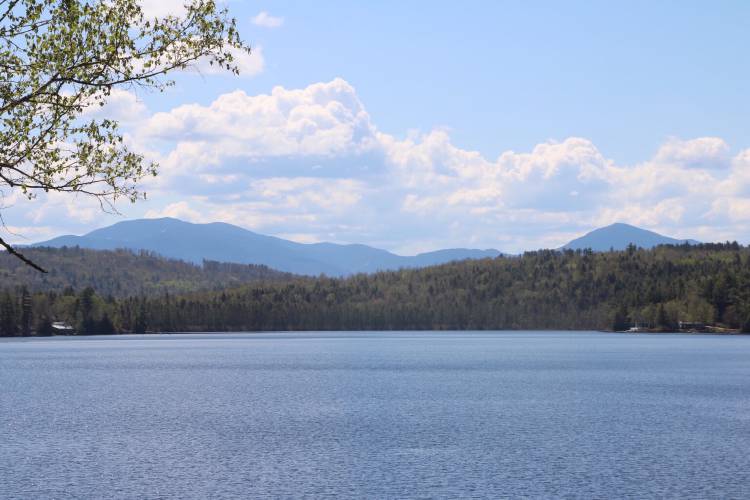‘Dump the Dump’: Casella’s Forest Lake landfill plan gets attention at State House

Residents of Dalton and surrounding communities raised concerns that pollutants from a landfill proposed by Casella Waste Management could contaminate Forest Lake.
| Published: 01-29-2025 5:54 PM |
Carolyn Choate had heard about Casella Waste Systems’ plan to build a landfill near Forest Lake in Dalton and the local community’s efforts to stop it.
Living in Nashua, far to the south, she kept wondering: How could a company that touts sustainability on its website be pushing for a landfill next to a freshwater lake in the North Country?
She needed to see the area for herself.
So, Choate drove north to get a sense of the place and to understand what the community was fighting for.
At a hearing Tuesday on a resolution urging the New Hampshire Department of Environmental Services to deny any permits for the project, Choate made it clear — this isn’t just a North Country issue.
She said that even from hours away, many people in southern New Hampshire feel as though it’s happening in their own backyard and they don’t want it.
“For our lake’s sake, dump the dump,” said Choate, a two-time cancer survivor. “I seriously hope we don’t let the financial interests of private industry outweigh what this small community wants and needs — because in the end, it affects all of us.”
Chaote, who studies how environmental factors like diet, stress and toxins affect genes, has researched the link between forever chemicals and cancer. While not actively fighting alongside the Dalton community against the proposed landfill, she opposes its construction, warning that it could contaminate nearby water sources with harmful chemicals.
Article continues after...
Yesterday's Most Read Articles
 Boutwell’s is now the biggest candlepin center in the state
Boutwell’s is now the biggest candlepin center in the state
 Home buying gets tougher as prices in New Hampshire continue to rise, outpacing national increase
Home buying gets tougher as prices in New Hampshire continue to rise, outpacing national increase
 Police investigating decomposed body found near Memorial Field
Police investigating decomposed body found near Memorial Field
 Reclaiming Healy Park: A symbol of renewal and a reckoning with homelessness in Concord
Reclaiming Healy Park: A symbol of renewal and a reckoning with homelessness in Concord
 Keep cool Concord: Four city pools open to residents and non-residents
Keep cool Concord: Four city pools open to residents and non-residents
 Pedestrian struck in Pittsfield, officials treat death as suspicious
Pedestrian struck in Pittsfield, officials treat death as suspicious
Since Casella Waste Systems proposed a landfill near Forest Lake in 2018, it has stirred strong opposition from both environmental advocates and local residents.
Their main concern is the risk to the lake’s water quality — if a leak were to happen, it could contaminate the lake. The site, which is in a sand and gravel pit, is particularly worrisome because leachate, the toxic runoff from the landfill, could easily seep into the ground, posing a serious threat to the environment.
Rep. Jared Sullivan, a Democrat from Bethlehem and Franconia, believes that while a resolution may not have the same impact as a bill, it can still make a powerful statement if the New Hampshire House passes it.
“I think it sends a strong message that this is something that is not a good idea to have … next to a lake.” said Sullivan. “This would just get a little bit more news coverage and we all know a lot of our constituents are living in bubbles. They’re not always paying attention to issues that are not in their backyards.”
If this legislation passes both the House and Senate, it will not prevent DES from permitting Casella’s proposed landfill but will instead serve as a statement from the General Court opposing the landfill in Dalton.
The House Environment and Agriculture Committee also heard testimony on House Bill 171, a bipartisan measure proposing a moratorium on new landfill permits until stronger rules and policies are established to safeguard both the environment and public health.
Rep. Nicholas Germana, the bill’s lead sponsor, argued that the DES rules approved in December fall short of what’s needed. He said the issue can no longer be tackled through rulemaking alone, and it’s now time for the “legislature to address these concerns through policy.”
Last year, the House passed a bill for a landfill moratorium, but it was shot down in the Senate.
Michael Wimsatt, the waste management division director at DES, said the department isn’t taking a stance on the bill either way.
Opponents of the moratorium usually point out that New Hampshire could run into a landfill capacity shortage if it were put in place. However, according to the state’s 2022 solid waste plan, nearly half of the waste in New Hampshire’s landfills actually comes from out of state, much of it from Massachusetts.
A bill last year to reduce out-of-state trash imports didn’t make it through, with some arguing it would interfere with the Interstate Commerce Clause. But states like Maine and Vermont have found ways to work around it.
Wayne Morrison, president of the North Country Alliance for Balanced Change, believes that to meet the state’s waste reduction goals, New Hampshire needs to focus not only on cutting food waste and expanding composting facilities but also on reducing the amount of out-of-state trash.
“The absolute elephant in the room in any of these conversations is out-of-state waste. It dwarfs anything else we do,” Morrison said in support of the bill. “Let’s take a pause and let’s fix this. Let’s not be the whipping boy for Massachusetts any longer.”







 Granite Geek: The circle of life is painful when watching the species-gets-killed part
Granite Geek: The circle of life is painful when watching the species-gets-killed part Concord’s two Rite Aid stores shutting soon
Concord’s two Rite Aid stores shutting soon
